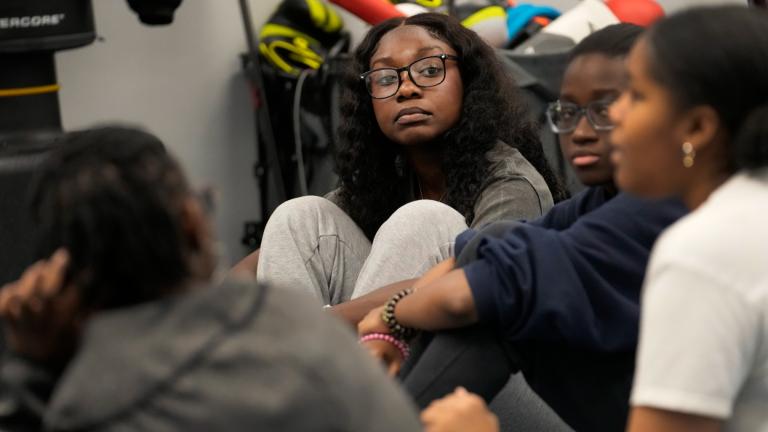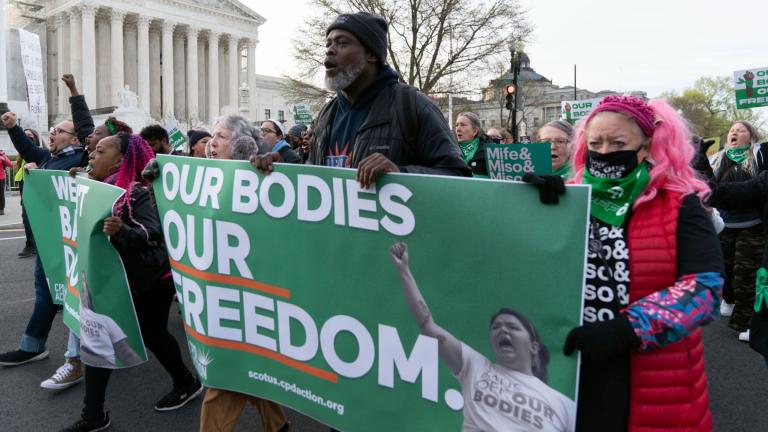While newly confirmed Justice Amy Coney Barrett dodged questions during her Senate hearings about how she’d weigh cases dealing with abortion, advocates on both sides view her leanings on the issue as a primary reason President Donald Trump chose her for the nation’s high court.
A 6-to-3 conservative majority on the Supreme Court that appears poised to overturn the landmark 1973 Roe v. Wade decision is, for Bob Gilligan, executive director of the Catholic Conference of Illinois, the culmination of decades of work.
“Many of my colleagues have been working on paving the way for a confirmation of someone like Amy Coney Barrett,” Gilligan said. “We’re full of hope.”
But in Illinois, he said, that mission remains daunting.
“If Roe was overturned tomorrow, it would not change Illinois continuing to have abortions,” said Ralph Rivera, a lobbyist with Illinois Right to Life Action.
That’s largely because of a law (SB25/775 ILCS 55) signed last year by Democratic Gov. J.B. Pritzker, which Rivera describes as “the most extreme abortion law in the country.”
Planned Parenthood of Illinois’ Brigid Leahy describes it otherwise.
“The Reproductive Health Act guarantees that reproductive rights are fundamental rights under Illinois law,” Leahy said. “The Reproductive Health Act guarantees that you have the right to make your own health care decisions when it comes to pregnancy, preventing pregnancy — like using birth control, your pregnancy plan, childbirth delivery and abortion.”
Abortion rights proponents worked to get the law passed in Illinois “because we anticipated that there might be a challenge in the Supreme Court to Roe v. Wade, and we knew that Donald Trump had on his agenda to make sure that the Supreme Court would be tilted; if he could appoint the justices that he wanted to, that he would … Donald Trump wants to move the Supreme Court more to the anti-abortion position and threaten the Roe v. Wade continuing.”
A law (HB 40 / P.A. 100-0538) controversially signed in 2017 by then-Gov. Bruce Rauner, to the consternation of conservative members of his Republican Party, had also recently repealed a so-called “trigger” law that would have made abortion illegal in Illinois should Roe v. Wade get overturned. The law also requires that Medicaid, the government’s health care program for low-income individuals, cover abortions.
Despite the laws protecting access to abortions in Illinois, Personal PAC’s Terry Cosgrove said both measures passed with slim margins.
“A new General Assembly, that could be elected on Nov. 3 of 2020, the anti-choicers could pick up four or five votes. They could pass a law that would undo everything that was in the Reproductive Health Act,” Cosgrove said. “On top of that, there are at least four lawsuits that are in court right now to reverse the Reproductive Health Act, which anti-choicers have filed.”
Cosgrove said he believes Illinois will be a national target for abortion opponents given that it stands as an island among neighboring states that restrict abortion access and are poised to make further restrictions should the Supreme Court give them that ability.
“We are the only state in the middle of the country that will, in the post-Roe era, the post-Coney Barrett era, where abortions will remain accessible,” Cosgrove said. “We are sitting in the middle of the country with a target on our backs by the national anti-choice movement, because they see the map, with Illinois being the only state in the middle of two coasts where abortion will be accessible.”
Ensuring that people have access to abortions in Illinois is just as much a goal for abortion rights proponents as ending it is for those on the other side of the movement, given that residents of states where the procedure is restricted or inaccessible can, and do, come to Illinois instead.
Both sides are gearing up for a strand of court cases on the state and national level, election battles and legislative ones.
Among the measures the Illinois General Assembly may be asked to tackle when the legislature reconvene is a yearslong push by abortion rights advocates to repeal a law that requires anyone under age 18 to notify their parents before they can have an abortion.
Leahy said Planned Parenthood finds that most minors do involve their parents; she said those who don’t have good reason.
“It is for very serious reasons and very serious circumstances in their life, and having to go to court does not help those circumstances,” she said. “It only creates another barrier that makes life harder for them, when they really need to have access to health care and services.”
But Gilligan said considering that Illinois requires parental notification, and even consent, when minors get a tattoo, the law should continue to require it should a minor seek an abortion.
In addition to fighting repeal of that law, Gillian said abortion rights opponents will again try to pass a bill that would require medical providers to offer to show a patient an ultrasound before proceeding with an abortion.
“She could say no and proceed with the abortion, but what we were trying to do is just show — she’s already paid for the procedure,” he said. “She should have the opportunity to see it because we know when you see the ultrasound that changes people’s minds. The fact of the matter is, technology proves that unborn child is a living human being that deserves protection.”
Follow Amanda Vinicky on Twitter: @AmandaVinicky








